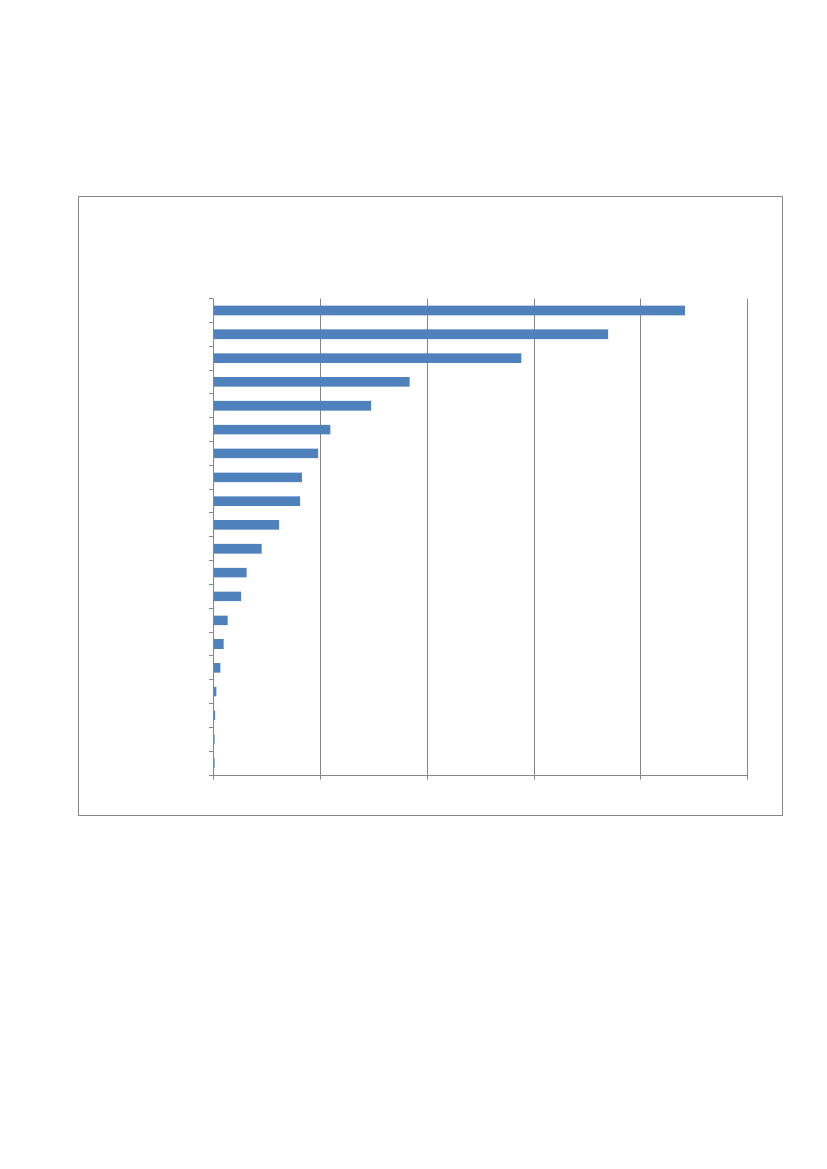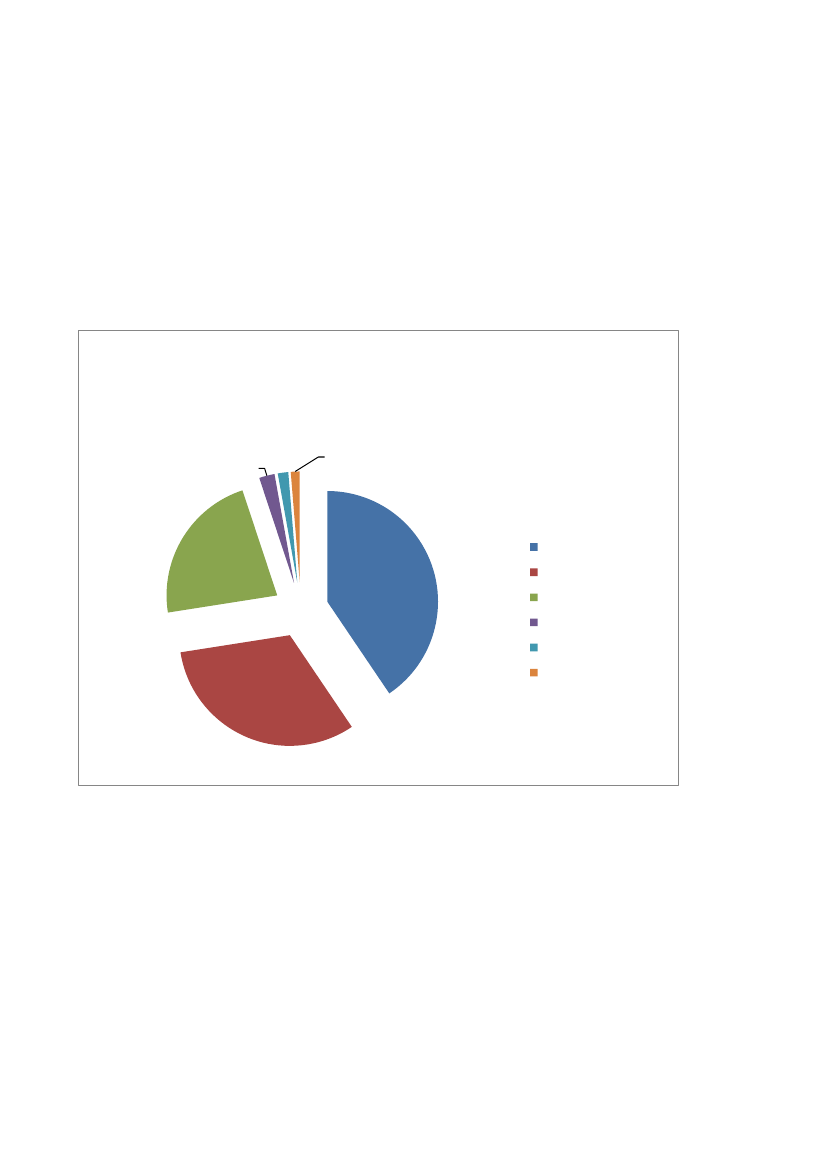Udenrigsudvalget 2012-13
URU Alm.del Bilag 16
Offentligt
DRAFTSTRATEGY FORTHE DANISH NEIGHBOURHOOD PROGRAMME2013-17
Introduction by the Minister for Development Cooperation andthe Minister for European Affairs
1
Introduction by the Minister for Development Cooperation and the Minister forEuropean Affairs .................................................................................................................. 11. A European Neighbourhood on the Move .............................................................. 32. Building Democracy and Good Governance ........................................................... 43. Promoting Economic Development ......................................................................... 64. Focusing on Selected Countries.................................................................................. 75. Allocating Funds............................................................................................................ 86. Creating Dynamic Partnerships .................................................................................. 87. Progress Monitoring ................................................................................................... 10Text Box: The Human Rights-Based Approach and the NeighbourhoodProgramme 2013-17 .......................................................................................................... 11Illustrations: Statistical Facts of the Neighbourhood Programme 2008-12 ............ 12Additional Text Boxes: Examples of Interventions from the NeighbourhoodProgramme 2008-12 .......................................................................................................... 15
2
1. A European Neighbourhood on the MoveA peaceful and stable Europe with freedom and progress for its citizens is closely dependent onthe development of democratic societies with accountable authorities, vibrant civil societies,well-functioning markets, and conflict resolution in all parts of the continent. To this aim, theDanish Neighbourhood Programme seeks to promote civil, political, social and economicrights – from the promotion of democratic rights to the right of people to benefit from basiceconomic opportunities in order to escape poverty and social degradation.Successive enlargements of the European Union have brought the countries in our Eastern andSouth-Eastern neighbourhood closer to the EU. Their security, stability and prosperityincreasingly impact on ours. Most of the countries are in a transition phase and are carrying outreforms in the political, social and economic spheres, though at different stages and pace. Mostof the countries have also to varying degrees stated their wish to develop closer relations withthe EU. In a number of countries, the EU plays an important role as a driving force forreforms.Danish assistance to this region has from its inception in the early 1990s aimed at supportingthese positive developments based on the policies and needs formulated by the partnercountries themselves. Following the fall of the Iron Curtain, it became clear that a sustainedeffort was needed in order to help the transition societies build democracy and achievesustainable growth. This led to the establishment of a number of cooperation initiatives, whichlaid the foundations for the present-day Danish Neighbourhood Programme.While the transition efforts of the past decades have markedly changed the lives andopportunities for many people in our European neighbourhood, important challenges remain.These include high levels of unemployment, especially amongst the youth. In terms ofindustrial production, the low-quality products produced under the inefficient commandeconomy were never able to compete in the international marketplace, and in many countriesindustrial output has still not fully recovered, thus hampering the prospects of job growth. Thishas exacerbated an already grave demographic crisis by forcing many to emigrate either withinthe region or to the EU and beyond. In some countries, private ownership of assets is in thehands of a relatively narrow group of people with little interest in changes to the status quo.Politically, all the countries adhere officially to a democratic form of government. Challengesremain in some places, however, for a truly democratic culture to take root. These include i.a.the full enjoyment of human rights, the respect for rule of law, the acceptance of independentmedia, and a vibrant civil society capable of holding the authorities to account. There remainsin some places of the region a potential for ethnic clashes, and the region harbours a number offrozen conflicts. In addition to these political challenges, the region struggles with a legacy ofsevere degradation of the environment with significant energy inefficiencies and pollutingtechnologies for power generation that remain in place to this day.The high number of challenges facing the region combined with the budgetary frame of theDanish Neighbourhood Programme necessitates a clear focus for the programme. The Danish
3
Neighbourhood Programme 2013-17 seeks to act as a catalyst for change in order to contributeto the fulfilment of two major objectives:Democracy and Good Governance, including respect for human rights, conflictresolution and peace-building, gender equality, minority rights, and strengthening of civilsociety.Economic Development, including private sector development aiming at promotingsustainable growth, skills development, job creation, energy efficiency and greentechnology.The Neighbourhood Programme is an integral part of Denmark’s overall foreign policy withrespect to the neighbourhood region and is based on the principles outlined in the strategy forDenmark’s development cooperation, “The Right to a Better Life”. The NeighbourhoodProgramme should also serve to reinforce Denmark’s bilateral relations with individualcountries in the region, including through strengthening personal, professional and economicties between private actors. Wherever possible, the Neighbourhood Programme will seeksynergies with instruments that promote business and trade relations between Danishcompanies and counterparts in the neighbourhood region, such as Denmark’s Export andCredit Agency (EKF) and the Investment Fund for Developing Countries (IFU) that offeradvice and risk capital to Danish companies wanting to set up a business in a number ofneighbourhood countries.Moreover, Denmark remains actively engaged in a range of EU policies in the region. Danishbilateral efforts are and will be in line with the strategic framework of the EuropeanNeighbourhood Policy and the EU enlargement process, as well as specific political initiativessuch as the EU’s Eastern Partnership and deep and comprehensive free-trade agreements withselected countries in the region based on common values.To most of the countries under the Danish Neighbourhood Programme, the EU is also by farthe biggest partner in terms of assistance, through financial instruments such as EU pre-accession assistance and the European Neighbourhood Partnership Instrument. The Danishassistance aims at complementing the assistance given through the EU and will be targeted atflexible interventions in selected priority areas where Denmark can make a difference.
2. Building Democracy and Good GovernanceMost countries in Europe’s Eastern neighbourhood are young democracies. One of thechallenges facing the region is to consolidate and expand the important gains made towards theestablishment of truly democratic societies with equal rights and opportunities for all, regardlessof gender, religion, ethnicity, age, disability, sexual orientation or gender identity. At the sametime, a stable democratic structure with accountable public institutions is a prerequisite forsustained economic growth and economic integration with the rest of Europe. The promotion
4
of democracy and good governance through targeted support for agents of change is thereforeone of the pillars of the Neighbourhood Programme.Assistance will focus on a limited number of key intervention areas:Independent public institutionsThe integration of human rights and good governance principles into national constitutions andlegislation – as well as their translation into action – is crucial for the development andconsolidation of democracy. Independent public institutions with a mandate to uphold humanrights and ensure the rule of law are therefore vital actors in any democratic society. TheNeighbourhood Programme will give support to institutions such as the ombudsman andnational human rights institutions to enable them to fulfil their mandates. Assistance couldencompass capacity development, training of staff, establishment of complaints mechanisms,facilitation of dialogue with government representatives, study visits and cross-bordercollaboration.An accountable and effective public administrationPublic institutions with the capacity to efficiently perform their role and being held accountableby their citizens are essential in any democracy. This includes adherence to the principles ofrule of law, equal access for all citizens to fair legal proceedings, transparent administration ofpublic funds, and inclusion of citizens in open decision-making processes. The NeighbourhoodProgramme will collaborate with selected national and local public authorities to this end.Assistance could encompass support to preparation and implementation of national policiesand reforms, development and application of anti-corruption measures, alignment tointernational best practices and EU standards, and enhanced capacity to interact with civilsociety actors.Civil society organisationsA strong, independent and diversified civil society is an essential part of a democratic society.Civil society actors contribute to promoting citizens’ rights to organize themselves, to expressviews, formulate demands and expectations to public authorities and other actors, and to act aswatchdogs and change agents. Civil society enables citizens to pursue their rights and interests –including social and economic rights – and contributes to inclusiveness and cohesion in society.Assistance from the Neighbourhood Programme could encompass capacity building of local,national and regional organisations as well as networks and umbrella organisations. Suchcapacity building would empower them to undertake advocacy and information campaigns,contribute to public hearings, enter into constructive dialogue with authorities, implementsmaller projects and strengthen their own popular, democratic and financial foundation.Conflict resolution and cross-border cooperationA number of internal and regional conflicts are latent in the region, often due to the presenceof ethnic minorities and unresolved situations for refugees and internally displaced persons.Some of these latent conflicts have turned violent in the past decades. The NeighbourhoodProgramme will continue to support efforts at conflict prevention and resolution as well aspeace building. Assistance could encompass the conduct of surveys and hearings, facilitation of
5
mediation and confidence building between conflicting partners, and support to regionalcooperation.Effective solutions to challenges like organised crime, migration, environmental protection andclimate change will often require joint and coordinated efforts between several countries andactors in the region. Assistance under the Neighbourhood Programme could include thepromotion of regional cooperation, capacity building of existing structures, and support forpreparation of joint policies and training.
3. Promoting Economic DevelopmentSecuring the right of people to benefit from basic economic opportunities in order to escapepoverty and social degradation constitutes the second pillar of the Neighbourhood Programme.Economic development, including promotion of growth and job creation, is essential forsecuring stability both within the neighbourhood region and in Europe as a whole. Povertyreduction and improving living conditions are also central preconditions for positivedemocratic developments based on broad popular participation and active engagement inpolitical processes.Assistance will focus on the following key intervention areas:Economic growth and job creation through development of SMEsThe economies in many countries of the region are characterised by low productivity, highunemployment levels, and impediments to private sector development. To fully develop theeconomic potential and to create jobs in the region, it is important to improve the conditionsand prospects of small and medium-sized enterprises (SME). Based on positive experienceswith a value chain approach, the Neighbourhood Programme will continue to support SMEs inparts of selected value chains with strong growth potential, particularly within agriculture andagribusiness due to the central importance of these sectors for most of the neighbourhoodcountries. Interventions may include support for policies to improve the general businessenvironment, capacity building of relevant public institutions, business organisations andbeneficiaries, as well as improved access to financial services.Skills developmentThe low productivity and high unemployment of many countries in the region are partlyexplained by an insufficiently skilled labour force. The Neighbourhood Programme willcontinue to support skills development through vocational training relevant for the value chainsselected for interventions to promote economic growth and job creation. This focus on skillsdevelopment and creation of new jobs will also serve to mitigate possible negative effects onemployment stemming from increased productivity in the selected value chains. Thus,interventions in support of skills development will most often be part of interventions insupport of SMEs. Interventions may also include specific gender oriented components.
6
Energy efficiency and introduction of green technologiesMost countries of the region are highly dependent on imports for their energy needs, whichconstitute a major burden on their economies. At the same time, consumption and productionin these countries are highly wasteful and characterised by inefficiency, and sustainableeconomic growth would require significant changes and reorientation.. As a new interventionarea, the Danish Neighbourhood Programme will therefore promote energy efficiency andgreen technologies, which are areas where Denmark possesses significant know-how.Interventions could include support to policy planning and regulation integratingenvironmental and energy efficiency considerations, support for multilateral financing facilitiesto modernise energy production and energy networks, and development of pilot projects topromote innovation and application of energy efficiency measures and green technologies.
4. Focusing on Selected CountriesGeographically, the Danish Neighbourhood Programme covers all Eastern and South-Easternneighbourhood countries. At the same time, to ensure effectiveness and synergy, it is necessaryto focus the bulk of the assistance and efforts on longer-term programmes in a limited numberof countries. Seven priority countries within the region have been selected on the basis of anassessment of i.a. possible impact, presence of relevant partners, lessons learned from previousprogrammes, as well as political considerations.The following priority countries have been identified:Eastern Partners: Belarus, Ukraine, Moldova and Armenia.Western Balkans: Albania, Bosnia-Herzegovina and Kosovo.Amongst the Eastern Partners, all three countries that share a border with the EU have beenchosen – i.e. Belarus, Ukraine and Moldova. At present, cooperation with Belarus is hamperedby the policies and practices of the current authoritarian regime, and assistance is limited to thearea of Democracy and Good Governance. When developments in Belarus merit moreextensive assistance cooperation, Danish assistance to the country could include the wholerange of assistance programmes offered to priority countries. In an effort to focus Danishassistance, Armenia has been selected as the only priority country in the Caucasus for theDanish Neighbourhood Programme 2013-17.In the Balkans, the three priority countries – Albania, Bosnia-Herzegovina and Kosovo – areamongst the poorest of that region in terms of GDI per capita, and all three face a number ofchallenges in securing both sustainable economic growth and the political reforms needed torealise their EU membership perspective. In light of its considerable progress over the pastdecade in moving towards integration with the rest of the EU, Serbia will be eligible for limitedsupport with emphasis on reforms related to its EU accession process within the area of goodgovernance.Developments in Russia and Turkey are important to the neighbourhood region – and to the7
EU. While Russia and Turkey are not priority countries, limited assistance will be given fortargeted interventions, particularly in the fields of civil society and the media. This assistancewill mainly be given on an ad hoc basis or as part of regional or thematic programmes.
5. Allocating FundsThe selection of the two overall pillars and of the seven priority countries of theNeighbourhood Programme have specific budget implications, as this prioritisation will guidethe programming of a grand total of DKK 1 billion (€ 133 million) foreseen allocated over thefive-year strategy period. Given the need to focus the assistance on larger interventions, it will,however, not be possible to cover all key intervention areas in all seven priority countries withinthe five-year timespan of the strategy. The Neighbourhood Programme is expected to launchtwo to four long-term interventions (typically 3-5 years) per year in selected priority countriesand within selected key intervention areas.As a general guideline, it is expected that approximately 80 % of the annual budgetary framewill be allocated to long-term support. Under current budgetary projections such interventionswill amount to DKK 160 million (€ 21.5 million) annually.The remaining approximately 20 % will be available for smaller and more flexible interventionsin the Neighbourhood region, e.g. in case of sudden conflict or the appearance of new politicalopportunities. This will amount to DKK 40 million (€ 5.5 million) annually under currentbudgetary projections. Secondments of experts to international organisations and participationof Danish institutions in EU twinning programmes will also be financed under this part of thebudget.The general allocation of funds between countries and specific programmes will be outlinedannually in the Danish Finance Act. Information about overall programming will be publishedon the webpage of the Ministry of Foreign Affairs upon approval.
6. Creating Dynamic PartnershipsThe overall responsibility for the implementation and administration of the NeighbourhoodProgramme rests with the Ministry of Foreign Affairs with the active involvement, wherepossible, of Denmark’s embassies in the region. Interventions will be based on mutuallycommitting partnerships. The aim is to ensure an equal partnership where all sides contributetheir part.Selection of partnersThe Ministry of Foreign Affairs will cooperate with agents of change and those partners thatare considered to best further the objectives of the Neighbourhood Programme. These can benational governments, ministries, local authorities, regional or international organisations, civilsociety organisations, private businesses, research institutions, and networks. The partnerships8
must be flexible in order to respond to challenges and changes of a political or economicnature. Capacity building of partners will be an essential part of most projects and programmes.The Neighbourhood Programme will be implemented by public and private partners of bothDanish, regional and international origin. The Ministry of Foreign Affairs will cooperatedirectly with multilateral organisations in areas where they possess the required capacity.Key criteria will be formulated when selecting private partners, including through tenderprocedures. Criteria may include the ability to build and sustain partnerships in recipientcountries; the ability of partners to transfer knowledge, technology and innovative solutions topromote economic development; and the ability of partners to transfer experience and methodsto national and local partners in support of democracy and good governance. Danish expertisewill be promoted wherever possible.Core principlesThe Danish Aid Management Guidelines will together with international aid effectivenessprinciples constitute the framework for the implementation of the Neighbourhood Programme.The main principles focus on ownership, results, inclusive development and partnerships, andtransparency and accountability:OwnershipInterventions will be aligned with national policies and/or priority conditions in therecipient countries to ensure national ownership. When supporting civil society actorswe will ensure that this support is based on clear visions and strategies of our partnersand – where relevant – reflecting national priorities and policies.ResultsInterventions should be designed to deliver measurable and sustainable results. Whererelevant, components will include building of partner capacity to develop and measureindicators in order for the partners to exercise timely adjustments of activities and toensure fulfilment of agreed objectives.Inclusive development and partnershipsOpenness, trust, and mutual respect and learning will be at the core of the partnerships,recognising the different and complementary roles of all actors – especially EU’sNeighbourhood Policy.Transparency and accountabilityThe Ministry of Foreign Affairs will hold partners accountable and promotetransparency and openness in the dialogue with partners and other development actorsand in the administration of projects and programmes.Intervention typesIn order to address the objectives of the Neighbourhood Programme, the implementation willbe based on various tailored types of intervention:9
Sector-specific programmesThe main part of the Neighbourhood Programme’s assistance is envisaged to take thisform. These programmes could be national, regional or thematic in scope and wouldnormally run 4-5 years. The relatively long grant periods aim at ensuring thedevelopment of strong partnerships and sustainable results while allowing for flexibilityin the implementation of activities.Ad hoc interventionsSmaller projects and ad hoc interventions are options in order to address immediatechallenges or new possibilities. Such interventions would primarily be used when flexibleand immediate responses to suddenly occurred situations or favourable politicaldevelopments are appropriate. These interventions will typically have a shorter timespan.SecondmentsAs a supplement to traditional interventions based on partnerships, a limited amount ofthe budget will be used for secondment of staff to international organisations withactivities relevant for the objectives of the Neighbourhood Programme. This instrumentis used strategically to advance Danish priorities. The secondment of staff shouldcontribute to reinforcing internationally established monitoring missions and to supportthe work of selected multilateral organisations. Until now, experts have primarily beenseconded to the OSCE and EU, including to their field missions.TwinningSupport to Danish public sector institutions to facilitate their participation in EUTwinning Programmes is an activity with relatively small budgetary impact but withsignificant multiplier effects. The aim of the twinning facility is to help EU candidatecountries and other EU neighbouring countries to develop modern and efficient publicadministrations with the structures, human resources and management skills needed toimplement EU regulations and standards. The Ministry of Foreign Affairs provideadvice and guidance about the rules for the twinning arrangements and can also providefunding to facilitate the participation of Danish public institutions in twinning projects.
7. Progress MonitoringThe Ministry of Foreign Affairs is responsible for monitoring the implementation of theNeighbourhood Programme based on input from all partners in the programme. Monitoringwill take place on a number of levels, including project, programme, country and thematiclevels. All grant holders will submit progress reports to the Ministry of Foreign Affairs basedon agreed guidelines and formats laid down in the Ministry’s Aid Management Guidelines.
10
Text Box: The Human Rights-Based Approach and theNeighbourhood Programme 2013-17Denmark will:Apply human rights as a core value in our partnerships and use principles of non-discrimination, participation, transparency and accountability in all phases of ourdevelopment cooperation.Work to promote all human rights – economic, social, cultural, civil and political – witha special focus on women’s rights and equal access to decision-making, resources andopportunities.Systematically strengthen capacity of public authorities, civil societies and rightsholders.“The Right to a Better Life”, chapter 3, June 2012The Neighbourhood Programme will apply a human rights-based approach in line with theoverall Strategy for Denmark’s Development Cooperation “The Right to a Better Life” (June2012). International human rights are part of Denmark’s core values and are a driver of change,precisely because they are based on commitments made by the countries themselves.The realisation of human rights requires a state with the will and ability to respect and upholdthese rights. At the same time it also requires well-informed and dynamic citizens andorganisations with access to reliable and independent information and to opportunities toparticipate actively in society and resume responsibility of the development of society. Theimplementation of the Neighbourhood Programme will be based on partnerships founded onshared values, which should underpin efforts to realise human rights, whether they be civil,political, economic, social or cultural. Support of a strong and independent civil society isfundamental when applying a human rights-based approach since the civil society often givesvoice to the most vulnerable and marginalised people.Equal participation of men and women in both economic activities and development of societyas such is essential to the Neighbourhood Programme which will encourage and ensure activeinclusion of aspects pertaining to gender equality and equal access in the preparation andimplementation of projects and programmes. Promotion and protection of the rights ofminorities is also vital to the rights based approach and the Neighbourhood Programme willavail support for targeted interventions.
11
Illustrations: Statistical Facts of the Neighbourhood Programme2008-12
Commitments per country (in million DKK)
Regional Prog.KosovoUkraineGeorgiaMoldovaArmeniaSerbiaBelarusAlbaniaBosnia-HerzegovinaTurkeyMontenegroRussiaTajikistanKyrgystanKazakhstanUzbekistanCroatiaAzerbaijanMacedonia04,73,31,40,80,50,5501001502006,754,74941,440,530,822,615,51373,891,7144184,6
220,5
250
12
Regional division of commitments under theNeighbourhood Programme 2008-12.2,3%1,5%1,3%
22,4%40,5%
Eastern PartnershipBalkansRegional ProgrammesTurkeyCentral AsiaRussia32,0%
13
Thematical division of commitments underthe Neighbourhood Programme 2008-12.
30,9%39,5%
Private Sector DevelopmentPublic Sector ReformsDemocracy and Human Rights,Media and Civil Society
29,7%
14
Additional Text Boxes: Examples of Interventions from theNeighbourhood Programme 2008-12Support for Parliamentary Development in Moldova
In cooperation with UNDP and Sweden, Denmark has supported the Parliament in Moldova in itsefforts to enhance the efficiency with which it carries out its functions and responsibilities. A well-functioning parliament is essential for the development of a viable democracy and an open societyin Moldova. The Danish-funded project is taking a comprehensive, long-term approach toparliamentary development, including strengthening of the parliament’s law-making, representationand oversight roles. The project supports, inter alia, the development and provision of IT equipmentthat will strengthen access to information of the members of parliament and the citizens (access todraft laws, amendments, votes in committees and plenary, access to records, etc.). This will allowthe views of citizens to be reflected in the work of parliament via e-petitions, e-mail, interactivewebsites and other tools allowing citizens voices to be heard more clearly and enhance contactbetween MPs and citizens.
Support for civil society in Ukraine
A vibrant and diverse civil society, whose voice is heard, is one of the cornerstones of a democraticsociety. Denmark has for many years supported the development of Ukrainian civil society. Danishsupport has inter alia resulted in a large number of smaller civil society organisations improvingtheir capacity to defend the rights of the individuals they represent. The Danish program has alsocontributed to the formulation of a new law on civil society organisations that meet internationalstandards. The law was signed in April 2012. In Luhansk in Eastern Ukraine a local civil societyorganisation with support from the Danish program succeeded in launching an advocacy campaignto ensure that the citizens and civil society organizations were consulted in the development of anew General City Plan of Luhansk. The plan would be implemented in the city over the followingten years and would have a major impact on daily life. The authorities had initially labelled thetown plan as a "classified" document with limited public access. But with an active civil societycampaign, which also involved extensive coverage from the local media side, this was changed. Thedocument was finally published, and citizens' right to be heard was secured.International Business College of Mitrovica (IBCM), Kosovo
IBCM is teaching at both sides of the Ibar River that separates the Kosovo-Serbian and Kosovo-Albanian sides of the city of Mitrovica in northern Kosovo. The college is politically neutral andopen to all ethnic groups. Today more than 350 students with different ethnic backgrounds and withan equal gender balance study at the college. IBCM’s teachers are also of different ethnicbackgrounds. Teaching is in English and based on modern principles. Graduates acquire skills witha strong EU orientation, which is needed by business and public institutions in the Mitrovica regionand beyond. All students complete internships and are assisted by IBCM’s career centre to find jobsor start their own business. A transitional programme prepares students from disadvantaged groupsto meet entry requirements and scholarships help these to enrol. It is expected that IBCM will be afinancially self-sustainable non-profit college by 2014. Tietgen Business College was chosen toassist IBCM with ensuring teaching levels at an international standard. International (German)accreditation of the college is expected by 2013. IBCM student Ms Miranda Rugovaj has recentlystarted her own strawberry farm based on the skills achieved at IBCM. She says: "IBCM courses15
were often challenging. But I succeeded. And I now feel optimally prepared for developing my newcompany."
Improving the value chain for aromatic plants in Albania
In Albania many families are involved in the collection and cultivation of aromatic plants. WithDanish support, farmers and agro-processors in the marginalised mountainous areas of Albaniahave improved sustainable harvesting, processing, and export. One of the many recipients ofDanish-funded technical assistance and grant support in the Shkodra region, Mr Ndoc Bashota hasworked for 10 years as a processor of sage, thyme and lavender. The assistance has allowed MrBashota to upgrade his processing line with modern technology. The upgrade has dramaticallyimproved Mr Bashota’s business: The number of seasonal collectors providing input to MrBashota’s factory has increased from 800 to 1,200 persons, the quantity of processed sage hasincreased from 45 tonnes of processed aromatic plants to 450 tonnes, and the selling price hasincreased by 30% due to better quality.16
















